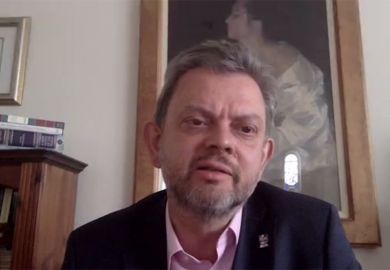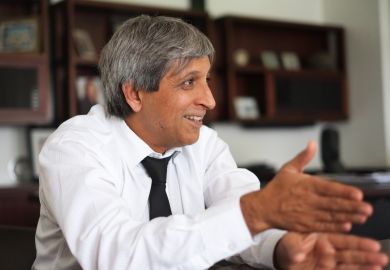Being forced to give grassroots staff more autonomy during the Covid-19 pandemic will benefit universities in the long run, a university president has said.
Firoz Rasul, head of Aga Khan University – which operates across Central and South Asia, East Africa and the UK – told the Times Higher Education World Academic Summit that the institution had seen “the emergence of the next level of leadership” during the crisis.
As a privately run non-profit, AKU could not rely on government financial support like most public institutions. With campuses and programmes in Pakistan, Afghanistan, Kenya, Tanzania, Uganda and the UK, it had to contend with even greater online communications challenges than traditional universities.
The Covid-19 pandemic also kept many patients from its affiliated hospitals, causing both a drop in vital income, as well as public health concerns for an institution that has always prided itself on its social development work.
The university management had no choice but to give its grassroots staff more autonomy during this time, a decision that turned out to benefit the institution in the long run.
“We empowered people on the ground, as the issues and severity of Covid varied by country,” Mr Rasul said. “We saw growth among those people, as they rose up and took on responsibilities that we weren’t aware they were capable of. We saw the emergence of the next level of leadership, who were not only able to deal with the crisis, but also able to deliver healthcare to communities and education to students.”
AKU used online meetings as much as was possible. The management team met four times a week at the same time each day: 5am in Nairobi, 7am in Karachi, and 7pm in Vancouver.
Each month, the management team would report on their newly revised goals during virtual town halls that could draw 2,000 to 3,000 participants. Members of the university community, all of whom took pay cuts, were eager to know when salaries and funding would return to normal.
“Although we couldn’t predict the future, we presented various scenarios, from the most pessimistic to the most optimistic,” Mr Rasul said.
Pakistan has had about 300,000 Covid-19 infections, with the rate of daily cases falling steadily since a peak in June. East Africa, meanwhile, has not been as hard hit as other areas. “We’ve managed to survive, recover and begin to rebuild,” Mr Rasul said.
Still, patients have been wary about traveling to medical appointments.
“In February, our hospitals were very busy with patients with diabetes, heart disease and cancer. But then, with lockdowns and curfews, they stopped coming, even though their illnesses had not gone away. If patients feel uncomfortable, how do we reach them?” Mr Rasul asked. AKU is now experimenting with telehealth options and ways to convince patients that facilities are safe.
AKU also plays a role in advising local governments, which gave its staff a sense of purpose during a crisis. “In the developing world, public systems are very fragile,” Mr Rasul said. “Everyone at AKU was engaged, everyone was doing something positive, and that kept morale up.”
“We’re steering a ship in a storm, and we don’t know when the storm will be over and where we will be when it is,” he concluded. “The fact is that we’re never going back to how things were before – and that realisation is starting to sink in.”
Register to continue
Why register?
- Registration is free and only takes a moment
- Once registered, you can read 3 articles a month
- Sign up for our newsletter
Subscribe
Or subscribe for unlimited access to:
- Unlimited access to news, views, insights & reviews
- Digital editions
- Digital access to THE’s university and college rankings analysis
Already registered or a current subscriber?








